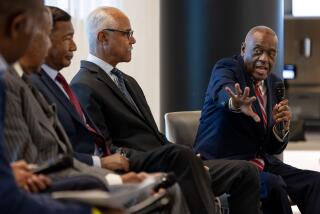Stockdale Says He Doubts Any POWs Were Left
- Share via
WASHINGTON — Retired Vice Adm. James Stockdale, the nation’s highest-ranking prisoner of war in Vietnam, told a Senate committee Thursday that POWs kept such careful track of one another that he doubts any could have been secretly kept behind at the end of the war.
In poignant testimony, Stockdale described how men who were tortured and isolated in dark dungeons found “a meaning of life centered on being your brother’s keeper” through a system of elaborate tap codes by which they learned and memorized one another’s names.
“The deepest fear in our hearts,” Stockdale said, “ . . . was to be stashed in isolation, there to expire by one means or another, leaving no audit trail with your surviving comrades that might some day reach your family as a credible account of your last days.”
Based on the information the POWs secretly shared with one another, Stockdale said, he does not believe that any servicemen were left behind in Vietnam at the end of the war.
The Medal of Honor winner, who recently achieved prominence as Ross Perot’s vice presidential running mate, testified before the Senate Select Committee on POW-MIA Affairs, which has been investigating the fate of missing servicemen.
In even more emotional testimony, Stockdale’s wife, Sybil, joined relatives of still-missing servicemen in describing what they called U.S. government deceit, indifference and stonewalling of their efforts to discover some word of their loved ones’ fates.
Choking back tears, wives, sons and brothers of the missing spoke of the betrayal they came to feel as they tried, in Sybil Stockdale’s words, “to untwist that braid of lies and deception, which have indeed emotionally involved the American people and have brought shame and disgrace on our country.”
Winding down a 15-month investigation, the committee turned its attention to the families of the 2,226 men who did not come home from the Vietnam War and whose bodies were never recovered.
Most of the testimony was bitterly critical of the manner in which the Pentagon and the State Department dealt with requests by families for information.
More to Read
Get the L.A. Times Politics newsletter
Deeply reported insights into legislation, politics and policy from Sacramento, Washington and beyond. In your inbox twice per week.
You may occasionally receive promotional content from the Los Angeles Times.










